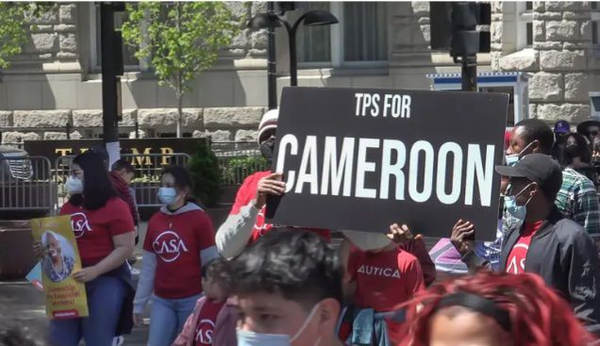- Details
- Politics
U.S. Terminates TPS for Cameroonians Amid Worsening Conflict Back Home
The Trump administration has formally announced the termination of Temporary Protected Status (TPS) for Cameroonian nationals living in the United States, a move expected to affect thousands of Cameroonians, especially those in Texas, home to one of the largest Cameroonian communities in the U.S.

The controversial decision will take effect on August 3, 2025, following a final two-month extension granted by the U.S. Department of Homeland Security (DHS).
Originally granted in 2022, TPS provided temporary legal protection for Cameroonians fleeing armed conflict, political repression, and humanitarian disaster. But according to a notice published in the Federal Register, the Trump administration argues that Cameroon no longer meets the criteria for continued designation under the program.
“The conflict in Cameroon’s Anglophone regions is far from over,” said Ryan Downer, legal director of the Washington Lawyers’ Committee for Civil Rights and Urban Affairs, who is now contesting the administration’s compliance with the 60-day legal notice requirement. “Lives are still at risk, and communities remain in ruin.”
Ignored and Abandoned? BBC and NRC Reports Say Yes
The TPS revocation comes at a time when international media and humanitarian agencies are sounding the alarm over Cameroon’s worsening crisis.
Just this month, the Norwegian Refugee Council named Cameroon as the world’s most neglected displacement crisis, surpassing conflicts in Sudan, the Democratic Republic of Congo, and Syria. The Council cited a combination of international apathy, lack of media coverage, and underfunded humanitarian responses as reasons why Cameroon’s conflict continues to spiral with little global intervention.
Adding to the urgency, BBC Africa Eye released a hard-hitting investigation exposing the violent realities of the Anglophone crisis, now in its ninth year. The documentary, led by Cameroonian journalist Blaise Eyong, offers rare insight into how ordinary civilians are trapped between Cameroon’s military forces and armed separatist fighters in the Northwest and Southwest regions.
“We’ve seen villages burned to the ground, children orphaned, and civilians executed,” Eyong narrates. “This is a silent war the world has chosen to ignore.”
The BBC report documents allegations of unlawful killings, rape, abductions, and systematic displacement, painting a dire picture that stands in stark contrast with the U.S. government's assertion that TPS is no longer warranted.
Short-Term Reprieve, Long-Term Uncertainty
While the Trump administration has issued a final 60-day extension until August 3, Secretary of Homeland Security Kristi Noem has confirmed that Cameroon no longer meets the "legal conditions" for TPS continuation. The decision followed internal reviews and consultations, despite a formal plea from over 20 U.S. lawmakers, who warned that ending the program now would expose thousands of Cameroonians to serious danger.
“The situation in Cameroon has not improved,” lawmakers wrote in their April letter. “Returning individuals to such conditions would be both unsafe and inhumane.”
Cameroonian nationals in the U.S. are now being urged to seek alternative immigration pathways, consider voluntary return, or access resources via the CBP One mobile app. But with so few legal options available, many fear that they could face detention or deportation.
Legal Challenges on the Horizon
Advocacy organizations contend the administration has not complied with federal law, which requires at least 60 days’ notice before ending TPS. Because DHS’s official notice came too late, groups argue that Cameroonian TPS should be automatically extended until December 2025.
“Part of the law’s intent was to offer TPS holders some stability,” said Downer. “You can’t pull the rug out from under vulnerable communities overnight.”
The TPS revocation follows the Trump administration’s broader efforts to roll back humanitarian protections for several nationalities, including recent TPS terminations for Afghans and Venezuelans.
Cameroon’s Crisis: An Open Wound
On the ground in Cameroon, the picture remains bleak. The Anglophone conflict, now entering its ninth year, has displaced more than one million people. Armed separatists and Cameroonian security forces remain locked in a violent stalemate marked by village burnings, arbitrary arrests, and civilian casualties.
Additionally, the Boko Haram insurgency in the Far North continues to destabilize communities, while regions face cholera outbreaks, hunger, and rampant poverty. Humanitarian aid is thin, and international attention has been alarmingly absent—until now.
As Cameroon suddenly gains rare global attention through BBC’s exposé and the NRC’s crisis designation, critics argue the U.S. should be expanding protections, not ending them.
“Cameroon needs international solidarity, not deportation orders,” said a humanitarian expert who requested anonymity.
Cameroon Concord News urges all Cameroonian nationals in the U.S. under TPS to consult legal counsel immediately and remain informed through DHS channels.
- Details
- News Team
- Hits: 1537
